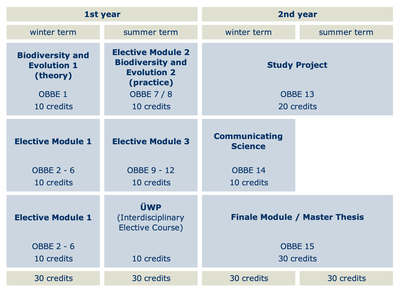M.Sc. Organismal Biology, Biodiversity and Evolution
Students of the international, research-oriented Masters's program study questions of modern Organismal Biology, Biodiversity and Evolution. A particular focus lies on the quantitative analysis of organisms, biodiversity and evolutionary processes applying modern physiological and molecular techniques and methods of population biology. Within the first year of the program, students attend several compulsory and elective modules that advance their competencies in the field. The second year is strongly research-oriented, including a study project and the final Master Thesis.
The framework of this consecutive Master's program is specified by the Study and Examination Regulations. The main text is only available in German, whereas the description of individual modules is in English.
Degree
Master of Science
Program duration
2 Years (4 Semesters)
Beginning
Winter term
Language
English
Credits
120 ECTS-Credits
Application Deadline
see Academic calendars and deadlines (non-restricted Master of Science)
Admission Requirements and Application Procedures
- Admission Regulations [GER]
- Self-Assessment regarding application Prerequisites [GER], [EN]
- Self-Assessment regarding Selection Criteria [GER], [EN]
Prospective students require a first academic degree obtained in a course of study with a minimum length of three years in a biological field; usually, a bachelor's degree of at least 180 ECTS credits or equivalent. All of the following academic requirements must be met by the applicants to be admitted to this consecutive program. To prove the former, applicants are required to complete the Self-Assessment form. Further information on requirements and the certificates to be submitted can be found in the subject-specific Admission Regulations available in German.
International applicants are offered initial counseling on the application procedure and requirements at HU International - Initial Counseling.
Please also take note of the FAQ - Application for Master's Programs at IfB.
Language Requirements
| Proficiency in English | C1 (CEFR) |
Academic Requirements
| Organismal Biology | 10 credits |
| Ecology, Biodiversity and/or Evolution | 5 credits |
| Molecular Biology | 5 credits |
| Animal or Plant Physiology | 5 credits |
| Chemistry | 5 credits |
| Physics | 5 credits |
| Mathematics and/or Statistics | 5 credits |
General information on the application for a master's program at HU
Application procedures and forms
Profile and Structure
The consecutive Master's program consists of compulsory (70 credits), elective (40 credits) and interdisciplinary elective modules (10 credits). During the first year, students attend one compulsory module ('Biodiversity and Evolution 1 - Theory') and four elective modules out of eleven modules offered. In the research-oriented second year, students conduct a study project, attend a further compulsory module ('Communicating science') and proceed to the final module, the Master Thesis.
Exemplary study plan M.Sc. Organismal Biology, Biodiversity and Evolution

Elective Modules
Students acquire a total of 40 credits, which corresponds to four elective modules (10 credits) to be chosen from the three different sectors listed below. For detailed descriptions of each module, see the Study and Examination Regulations.
Elective Modules 1 (choose two modules)
| OBBE 2 | Soil Ecosystems as Biodiversity Hot Spot |
| OBBE 3 | Cognition, Evolution and Behaviour |
| OBBE 4 | Macroevolution and Biodiversity |
| OBBE 5 | Evolution, Structure and Function of Land-living Vertebrates |
| OBBE 6 | Special Topics in Organismal Biology 1 |
Elective Modules 2 (choose one module)
| OBBE 7 | Biodiversity and Evolution 2 (Practice) – Collections |
| OBBE 8 | Biodiversity and Evolution 2 (Practice) – Field studies |
Elective Modules 3 (choose one module)
| OBBE 9 | Marine Biodiversity |
| OBBE 10 |
Plant Systematics and Evolution |
| OBBE 11 | Behavioral Physiology |
| OBBE 12 | Special Topics in Organismal Biology 2 |
Study Project / Master Thesis
A group or individuals work on a scientific project that has to be related to the theoretical and experimental topics of this Master's program. The study project extends over one or two semesters and comprises several hours of experimental work and a protocol. Scientific projects can be conducted at the Department of Biology or an associated research organization, for instance, at the Museum für Naturkunde. Students apply autonomously to research groups of their field of interest. For further information on the modalities of the Study Project, please contact the Examination Office Biology/Biophysics.
Within the Final Module, students use their specific knowledge in a current research topic in the field of Organismal Biology, planning and conducting a scientific project at current research standards independently, and writing the Master Thesis.
ÜWP - Interdisciplinary Elective Modules
Students are free to attend modules of the Interdisciplinary Elective Area (ÜWP) in other disciplines or institutions of the university according to their own preferences. The modules offered in this sector are posted on AGNES - ÜWP. Under certain circumstances, it is possible to attend regular modules of other programs (Non-ÜWP-Modules). If you are interested in attending Non-ÜWP-Modules, please contact the Examination Office Biology/Biophysics for detailed information.
Contact
Information on Application, Admission and Enrollment
- for Applicants: HU Compass
- for international Applicants: HU International
Informationen on Content and Structure of the Program
Different request? Find the appropriate contact at Hilfe und Beratung.

